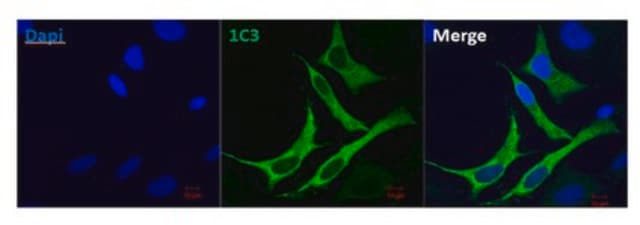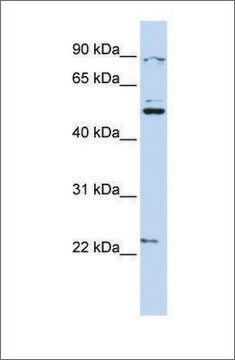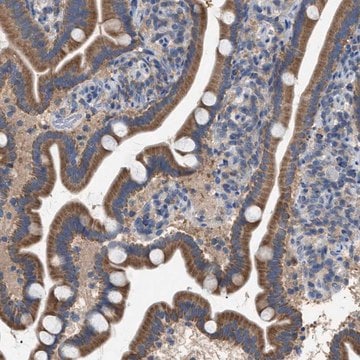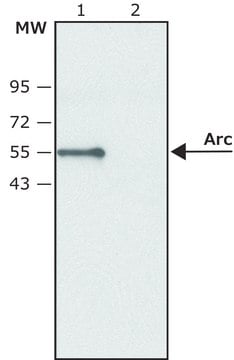推荐产品
生物源
rabbit
共軛
unconjugated
抗體表格
affinity isolated antibody
抗體產品種類
primary antibodies
無性繁殖
polyclonal
產品線
Prestige Antibodies® Powered by Atlas Antibodies
形狀
buffered aqueous glycerol solution
物種活性
human
技術
immunofluorescence: 0.25-2 μg/mL
immunohistochemistry: 1:1000-1:2500
免疫原序列
DLSRDRPLVLLLHLLQLGPLFRCFEVFCIYFQSGNNEEPYVSITKKRQMPKNGLSEEIEKEVGQAEGKLITHRSAFSRA
UniProt登錄號
運輸包裝
wet ice
儲存溫度
−20°C
目標翻譯後修改
unmodified
基因資訊
human ... XK(7504)
一般說明
The gene XK (membrane transport protein) is mapped to human chromosome Xp21.1. It is widely expressed with strong expression in red cells, nervous tissue and heart.
免疫原
X-linked Kx blood group
應用
All Prestige Antibodies Powered by Atlas Antibodies are developed and validated by the Human Protein Atlas (HPA) project and as a result, are supported by the most extensive characterization in the industry.
The Human Protein Atlas project can be subdivided into three efforts: Human Tissue Atlas, Cancer Atlas, and Human Cell Atlas. The antibodies that have been generated in support of the Tissue and Cancer Atlas projects have been tested by immunohistochemistry against hundreds of normal and disease tissues and through the recent efforts of the Human Cell Atlas project, many have been characterized by immunofluorescence to map the human proteome not only at the tissue level but now at the subcellular level. These images and the collection of this vast data set can be viewed on the Human Protein Atlas (HPA) site by clicking on the Image Gallery link. We also provide Prestige Antibodies® protocols and other useful information.
The Human Protein Atlas project can be subdivided into three efforts: Human Tissue Atlas, Cancer Atlas, and Human Cell Atlas. The antibodies that have been generated in support of the Tissue and Cancer Atlas projects have been tested by immunohistochemistry against hundreds of normal and disease tissues and through the recent efforts of the Human Cell Atlas project, many have been characterized by immunofluorescence to map the human proteome not only at the tissue level but now at the subcellular level. These images and the collection of this vast data set can be viewed on the Human Protein Atlas (HPA) site by clicking on the Image Gallery link. We also provide Prestige Antibodies® protocols and other useful information.
生化/生理作用
XK (Membrane transport protein) is linked to the cell membrane protein, KELL (Kell blood group glycoprotein), via disulfide bond. Mutations in XK causes McLeod syndrome, characterized by weakening of KELL system antigens and neuroacanthocytosis. Humans suffering from McLeod phenotype develop late-onset neuromuscular defects. XK is also linked with neuroacanthocytosis in mood disorder and schizophrenia.
特點和優勢
Prestige Antibodies® are highly characterized and extensively validated antibodies with the added benefit of all available characterization data for each target being accessible via the Human Protein Atlas portal linked just below the product name at the top of this page. The uniqueness and low cross-reactivity of the Prestige Antibodies® to other proteins are due to a thorough selection of antigen regions, affinity purification, and stringent selection. Prestige antigen controls are available for every corresponding Prestige Antibody and can be found in the linkage section.
Every Prestige Antibody is tested in the following ways:
Every Prestige Antibody is tested in the following ways:
- IHC tissue array of 44 normal human tissues and 20 of the most common cancer type tissues.
- Protein array of 364 human recombinant protein fragments.
聯結
Corresponding Antigen APREST74335
外觀
Solution in phosphate-buffered saline, pH 7.2, containing 40% glycerol and 0.02% sodium azide
法律資訊
Prestige Antibodies is a registered trademark of Merck KGaA, Darmstadt, Germany
免責聲明
Unless otherwise stated in our catalog or other company documentation accompanying the product(s), our products are intended for research use only and are not to be used for any other purpose, which includes but is not limited to, unauthorized commercial uses, in vitro diagnostic uses, ex vivo or in vivo therapeutic uses or any type of consumption or application to humans or animals.
Not finding the right product?
Try our 产品选型工具.
儲存類別代碼
10 - Combustible liquids
水污染物質分類(WGK)
WGK 1
閃點(°F)
Not applicable
閃點(°C)
Not applicable
Chase Amos et al.
Contact (Thousand Oaks (Ventura County, Calif.)), 6, 25152564231215133-25152564231215133 (2023-12-25)
Mutations of the bridge-like lipid transport protein VPS13A and the lipid scramblase XK result in Chorea Acanthocytosis (ChAc) and McLeod syndrome (MLS), respectively, two similar conditions involving neurodegeneration and deformed erythrocytes (acanthocytes). VPS13A binds XK, suggesting a model in which
Jae-Sook Park et al.
Molecular biology of the cell, 31(22), 2425-2436 (2020-08-28)
Vps13 is a highly conserved lipid transfer protein found at multiple interorganelle membrane contact sites where it mediates distinct processes. In yeast, recruitment of Vps13 to different contact sites occurs via various partner proteins. In humans, four VPS13 family members
Patrycja M Dubielecka et al.
Journal of the neurological sciences, 305(1-2), 160-164 (2011-04-06)
McLeod syndrome (MLS) is a rare, X-linked, late-onset, disease involving hematological, brain, and neuromuscular systems, caused by mutations in XK that result in either defective XK or complete loss of XK protein. Acanthocytosis of erythrocytes is a typical feature. We
A Danek et al.
Annals of neurology, 50(6), 755-764 (2002-01-05)
McLeod syndrome is caused by mutations of XK, an X-chromosomal gene of unknown function. Originally defined as a peculiar Kell blood group variant, the disease affects multiple organs, including the nervous system, but is certainly underdiagnosed. We analyzed the mutations
David C W Russo et al.
Transfusion, 42(3), 287-293 (2002-04-19)
The McLeod phenotype is defined by absence of Kx, weakening of Kell system antigens, and acanthocytosis. Individuals with the McLeod phenotype usually develop late-onset neuromuscular abnormalities. Gene deletions, insertions, and point mutations that affect RNA splicing or that lead to
我们的科学家团队拥有各种研究领域经验,包括生命科学、材料科学、化学合成、色谱、分析及许多其他领域.
联系技术服务部门








